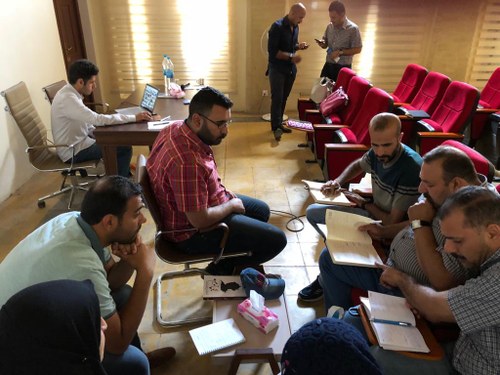In the frame of the EDUU Project – WP2, three training courses were held in Baghdad on the first two weeks of April 2018.
The courses, organised and held in the premises of the Iraqi-Italian Center for Archaeological Sciences and Restoration of Baghdad, in the historical quarter of the Qislah, were attended by officials and functionaries from the State Board of Antiquities and Heritage (SBAH), the Iraq Museum (IM) and the University of Baghdad (UoB).
The first course (History of Archaeological Restoration and Museology) was held by Arch. Roberto Parapetti of Monumenta Orientalia and by Eng. Ala’ Anbaki, who in this last decade had worked together at the rehabilitation of the Iraq Museum (Islamic and Assyrian galleries, Mirjaniya madrasa).
This first course introduced the trainees to the history of restoration (methodologies, history and case-studies were presented) and then moved on topics related to the museology and museography. In particular, the two Lecturers’ experience in the works at the Iraq Museum allowed the trainees to get an overview of the museological aspects related to the works carried out in the Museum of Baghdad.
A second course (Controlling the Past, Owning the Future: Public Heritage vs Political Uses of Archaeology in Modern States), held by Prof. Carlo Lippolis of the University of Turin, was focused both on the Museology and on the Public Archaeology.
In the first case, the Lecturer illustrated a recent exhibition organized in Turin where both contemporary and ancient artworks were exposed, side by side, on the topic of the destruction of the heritage. The lecture was conceived as a virtual visit of the exhibition through videos and soundtracks.
The second part of this course was focused on the theme of propaganda and instrumentalisation of the archaeology and of the cultural heritage by the dictatorships in modern societies, in order to draw the attention of the audience to the existence of a “negative heritage” that could have a negative effect on the perception and awareness of the common heritage.
The third course (International Legislation for Protection and Management of Heritage) was held by Dr. Alessandra Peruzzetto of World Monument Fund (Paris).
The course concerned the international legislation about the cultural heritage. Case-studies of important sites of the Middle East were presented, and, on the last morning of the course, a useful practice exercise was carried out by the trainees, with the Lecturer’s constant support: they had to choose an archaeological site and work together, according to what had been discussed in the previous days, in order to find and/or define “values, significance, stakeholders, management, boundaries, protection measures, etc”.


